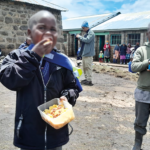The first research paper assessing dementia prevalence in Lesotho has found a 4.89 percent prevalence of dementia in the country.
The research paper titled ‘Prevalence and Factors Associated with Dementia in Lesotho: A Cross-Sectional, Population-Based Study’ was published in February 2025.
Among adults over 55, factors such as depression and being underweight were associated with an increased risk of dementia, while physical activity and obesity were linked to a lower risk.
“We found no association with other commonly reported risk factors, such as HIV, sex, arterial hypertension, or alcohol or tobacco use,” the study states.
The researchers noted: “We found no significant association between self-reported living with HIV and dementia. One potential explanation could be the successful rollout of antiretroviral therapy, thus mitigating the neurological effects of HIV. The absence of sex as a factor associated with dementia is mirrored by the findings of a recent study in South Africa.”
Dementia diagnosis in Lesotho is limited to mental health specialists primarily located in the capital, Maseru, at the country’s only psychiatric hospital.
This limitation highlights the importance of the study’s use of the Community Screening Instrument for Dementia (CSI-D), which has shown high sensitivity and specificity in similar settings, making it a valuable tool for identifying potential dementia cases in areas with limited clinical diagnostic services.
Globally, dementia remains a major cause of death and disability. A 2019 study on the worldwide costs of dementia estimated the annual societal costs at $1.3 trillion for 55.2 million people affected, averaging $23,796 per person.
“Of the total, $213.2 billion, or 16 percent, were direct medical costs; $448.7 billion, or 34 percent, accounted for direct social sector costs, including long-term care; and $651.4 billion, or 50 percent, covered the costs of informal care,” the study highlighted.
It further found that: “The huge costs of dementia worldwide place enormous strains on care systems and families alike. Although most people with dementia live in low- and middle-income countries, the highest total and per-person costs are seen in high-income countries.”
While 61 percent of people with dementia live in low- and middle-income countries, 74 percent of the total economic burden falls on high-income countries.
The World Health Organisation (WHO) describes dementia as “an umbrella term for several diseases affecting memory, other cognitive abilities, and behaviour that interfere significantly with a person’s ability to maintain their activities of daily living.”
WHO also emphasises: “Although age is the strongest known risk factor for dementia, it is not a normal part of aging.”
Currently, 55.2 million people worldwide live with dementia, and it is the seventh leading cause of death globally, with women accounting for 65 percent of dementia-related deaths, and dementia is the 7th leading cause of death globally, according to WHO.

Ntsoaki Motaung is an award-winning health journalist from Lesotho, specializing in community health stories with a focus on sexual and reproductive health and rights, as well as HIV. She has contributed to platforms like “Be in the KNOW,” highlighting issues such as the exclusion of people with disabilities from HIV prevention efforts in Lesotho.
In addition to her journalism, Ntsoaki serves as the Country Coordinator for the Regional Media Action Plan Support Network (REMAPSEN). She is also a 2023 CPHIA Journalism Fellow.












